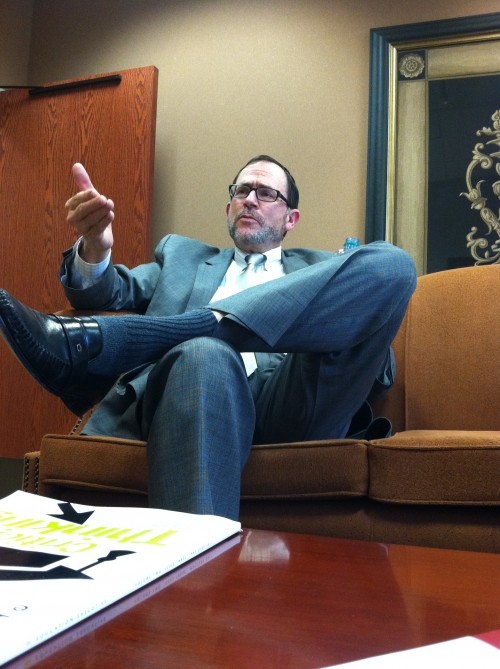On Feb. 21, local news organizations contacted Carmel Clay Schools to uncover information about an alleged locker room incident at this school. As printed in its press release, the district “will not confirm or deny any student misconduct.”
Principal John Williams said Carmel Clay Schools has adopted this procedure to limit the public from access to private information about students, a policy that adheres to the Family Educational Rights and Privacy Act (FERPA).
Superintendent Jeff Swensson said when discipline issues arise, it is the district’s goal to treat any disciplinary incidents strictly as discipline matters, not something meant to harm future college and career endeavors by releasing student names and details.
Williams said, “Just like we don’t send out an email every time a student gets in a fight or cheats on a test, we don’t share this with the media. But we do have a very clear responsibility to the parents that are involved, and we take that very seriously.”
Williams said school officials have already discussed the allegations with the parents of the students involved.
“(For these situations), we’re going to tell the people that need to know,” he said. “We’ll let the parents know, and if it’s appropriate for the police to know, we’ll let them know. We’ll fully cooperate with any investigations that go. Of course, if attorneys ask for subpoenas, we will always participate in that. But other than that, we’re not going to sensationalize student behavior.”
As detailed in the press release, the procedure consists of four steps. When a report of student misconduct is received, the situation is investigated and, if necessary, reported to authorities. The authorities then conduct a separate investigation to decide on a course of action. Third, based on investigations conducted by school officials, the district applies appropriate disciplinary consequences. Finally, parents of involved students are notified.
Williams said, “I feel good about the way we dealt with it, and I think we shared it with the appropriate people. It is a student discipline issue that was dealt with here at school, and it’s not something our district has decided to share with the media.”
Swensson said although adult supervision of students has increased since the release of the district’s new bullying policy in 2010, increased supervision does not necessarily mean such incidents won’t happen.
“Prevention of behavior presumes a level of knowledge about (someone being) about to engage in the behavior,” Swensson said.
School social worker Jane Wildman said, like Swensson, most incidents are a discipline matter and only when the individuals involved are troubled or anxious about going to school does her office step in.
Wildman said her office is more focused on bullying prevention, something she said she does alongside school resource officer Phil Hobson in talks with freshman gym classes.
Wildman said, “We try to be proactive.”




























![Keep the New Gloves: Fighter Safety Is Non-Negotiable [opinion]](https://hilite.org/wp-content/uploads/2024/12/ufcglovescolumncover-1200x471.png)















































![Review: “We Live in Time” leaves you wanting more [MUSE]](https://hilite.org/wp-content/uploads/2024/12/IMG_6358.jpg)
![Review: The premise of "Culinary Class Wars" is refreshingly unique and deserving of more attention [MUSE]](https://hilite.org/wp-content/uploads/2024/12/MUSE-class-wars-cover-2.png)
![Introducing: "The Muses Who Stole Christmas," a collection of reviews for you to follow through winter [MUSE]](https://hilite.org/wp-content/uploads/2024/12/winter-muse-4.gif)
![Review: "Meet Me Next Christmas" is a cheesy and predictable watch, but it was worth every minute [MUSE]](https://hilite.org/wp-content/uploads/2024/11/AAAAQVfRG2gwEuLhXTGm3856HuX2MTNs31Ok7fGgIVCoZbyeugVs1F4DZs-DgP0XadTDrnXHlbQo4DerjRXand9H1JKPM06cENmLl2RsINud2DMqIHzpXFS2n4zOkL3dr5m5i0nIVb3Cu3ataT_W2zGeDAJNd_E-1200x884.jpg)
![Review: "Gilmore Girls", the perfect fall show [MUSE]](https://hilite.org/wp-content/uploads/2024/11/gilmore-girls.png)
![Review in Print: Maripaz Villar brings a delightfully unique style to the world of WEBTOON [MUSE]](https://hilite.org/wp-content/uploads/2023/12/maripazcover-1200x960.jpg)
![Review: “The Sword of Kaigen” is a masterpiece [MUSE]](https://hilite.org/wp-content/uploads/2023/11/Screenshot-2023-11-26-201051.png)
![Review: Gateron Oil Kings, great linear switches, okay price [MUSE]](https://hilite.org/wp-content/uploads/2023/11/Screenshot-2023-11-26-200553.png)
![Review: “A Haunting in Venice” is a significant improvement from other Agatha Christie adaptations [MUSE]](https://hilite.org/wp-content/uploads/2023/11/e7ee2938a6d422669771bce6d8088521.jpg)
![Review: A Thanksgiving story from elementary school, still just as interesting [MUSE]](https://hilite.org/wp-content/uploads/2023/11/Screenshot-2023-11-26-195514-987x1200.png)
![Review: "When I Fly Towards You", cute, uplifting youth drama [MUSE]](https://hilite.org/wp-content/uploads/2023/09/When-I-Fly-Towards-You-Chinese-drama.png)
![Postcards from Muse: Hawaii Travel Diary [MUSE]](https://hilite.org/wp-content/uploads/2023/09/My-project-1-1200x1200.jpg)
![Review: "Ladybug & Cat Noir: The Movie," departure from original show [MUSE]](https://hilite.org/wp-content/uploads/2023/09/Ladybug__Cat_Noir_-_The_Movie_poster.jpg)
![Review in Print: "Hidden Love" is the cute, uplifting drama everyone needs [MUSE]](https://hilite.org/wp-content/uploads/2023/09/hiddenlovecover-e1693597208225-1030x1200.png)
![Review in Print: "Heartstopper" is the heartwarming queer romance we all need [MUSE]](https://hilite.org/wp-content/uploads/2023/08/museheartstoppercover-1200x654.png)




